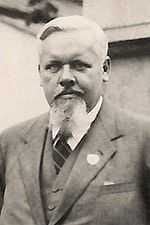Oskar Anderson
| Oskar Anderson | |
|---|---|
 Oskar Anderson in Tartu (around 1930) | |
| Born |
Oskar Johann Viktor Anderson August 2, 1887 Minsk, Russian Empire |
| Died |
February 12, 1960 (aged 72) Munich, Germany |
| Nationality | German, Bulgarian |
| Fields | |
| Institutions | |
| Alma mater |
|
| Thesis | (1912) |
| Academic advisors | Alexander Alexandrovich Chuprov |
| Known for | Variate Difference Method |
| Spouse | Margarethe Natalie von Hindenburg-Hirtenberg[1] |
Oskar Johann Viktor Anderson (2 August 1887, Minsk, Russian Empire – 12 February 1960, Munich, Germany) was a German-Russian mathematician. He was most famously known for his work on mathematical statistics.
Life
Anderson was born from a German family in Minsk (now in Belarus), but soon moved to Kazan (Russia). His father, Nikolai Anderson, was professor in Finno-Ugric languages at the University of Kazan. His older brothers were the folklorist Walter Anderson and the astrophysicist Wilhelm Anderson. Oskar Anderson graduated from Kazan Gymnasium with a gold medal in 1906. After studying mathematics for one year at the University of Kazan, he moved to St. Petersburg to study economics at the Polytechnic Institute. From 1907 to 1915, he was Aleksandr Chuprov's assistant. In 1912 he started lecturing at a commercial school in St. Petersburg. In 1918 he took on a professorship in Kiev but he was forced to flee Russia in 1920 due to the Russian Revolution, first taking a post in Budapest (Hungary) before becoming a professor at the University of Economics at Varna (Bulgaria) in 1924.
Anderson was one of the charter members of the Econometric Society,[1] whose members also elected him to be a fellow of the society in 1933.[2]
In 1935 he was appointed director of the Statistical Institute for Economic Research at the University of Sofia and in 1942 he took up a full professorship of statistics at the University of Kiel, where he was joined by his brother Walter Anderson after the end of the second world war. In 1947 he took a position at the University of Munich, teaching there until 1956, when he retired.
Writings
- Über die repräsentative Methode und deren Anwendung auf die Aufarbeitung der Ergbnisse der bulgarischen landwirtschaftlichen Betriebszählung vom 31. Dezember 1926, München : Bayer. Statist. Landesamt, 1949
- Die Saisonschwankungen in der deutschen Stromproduktion vor und nach dem Kriege , München : Inst. f. Wirtschaftsforschung, 1950
External links
- "Oskar Anderson". University of St. Andrews on Oskar Anderson. Retrieved March 15, 2005.
- "Oskar Anderson". Christian-Albrechts-Universität zu Kiel, Famous scholars from Kiel. Retrieved April 8, 2011.
References/Further reading
- ↑ 1.0 1.1 1.2 1.3 Seneta, Eugene William (2010). "Oskar Anderson". StatProb: The Encyclopedia Sponsored by Statistics and Probability Societies. Springer Science+Business Media, LLC.
- ↑ "In Memoriam". List of Deceased Fellows of the Econometric Society. Retrieved December 1, 2012.
- Sheynin, O.B. (1970). "Anderson, Oskar Johann Viktor". Dictionary of Scientific Biography 1. New York: Charles Scribner's Sons. pp. 154–155. ISBN 0-684-10114-9.
|